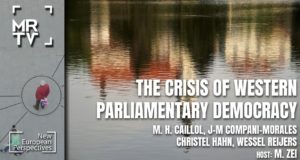The management of linguistic diversity is one of the major challenges of European integration; it lies at the heart of what is Europe’s motto: “In varietate concordia” (Unie dans la diversité). Unfortunately, the staff and political and administrative structures currently in charge of meeting the challenges of European integration are no longer up to the task. And the thorny question of languages is already starting to take its toll.
Between cacophony and the temptation of monolingualism
The European Union now has 23 official languages for 27 states. To this must be added regional or nationalising languages (such as Irish, which is not yet an official language of the EU but has been accepted as a working language) that are the subject of intensive lobbying by many regional or nationalist movements (e.g. Austria, which claims the Austrian language, etc.). In linguistic terms, as in many other areas, the main “transformative” energies deployed in the EU are more concerned with the demands of minorities than with the interests of all European citizens (an interest that is no longer supported by any structure, hence the strength of all those lobbies that are advancing in virgin territory). Unfortunately, this type of energy contributes to making the EU political entity so complex that it is perfectly unmanageable.
On the other hand, since about 2005, French has almost ceased to be used in internal European Commission working meetings – despite the fact that it is bound by English-French bilingualism. At a time when English is losing ground as a neutral and international language among public opinion (especially among the youngest, who now associate it with the frightening geo-political tensions under way), our “elites” (European and national) are laying down their arms and switching to English at all! Such an elite-people gap (simply corresponding to a gap between leaders and reality) does not augur well for the ability of these same elites to successfully weather crises in the process of development.
However, the policy of dual working language within the European institutions is at the heart of the general policy of preserving linguistic diversity in Europe. Knowing that the European Commission is the guardian of the Treaties, the shift towards all-English corresponds to a pure and simple betrayal of the spirit of European integration. How can we expect language learning to make the progress that these same European officials, with their contempt for the European people, constantly demand, when they themselves do not require the mastery of more than one foreign language (English can even afford the luxury of not speaking any foreign language)?
We, the citizens of Europe, have everything to lose from these simplifying and simplistic tendencies.
Linguistic diversity and the democratic imperative
The more some dream of a Europe that accepts their regional language, the more others dream of a Europe that speaks only one language. Of course, the latter are based on the idea that a common working (or written) language is compatible with the maintenance of national and regional (or oral) languages. We have already seen this in history: large geo-political entities composed of disparate cultural and linguistic groups imposing a common language of communication with the authorities: China and Mandarin, Rome and Latin, the Arab world and Arabic, the French and French empire, the British empire and the English empire… and today the EU and English – in draft form at least.
Why do we have to eliminate any dream of monolingualism from the project of a democratic Europe? In a nutshell, the imposition of a common vehicular language on a culturally disparate entity is an “imperial” method of managing diversity. It automatically generates the appearance of castes and centres of power, privileges the part over the whole… This method is well known in Europe: from Napoleon to Hitler, many people wanted to unify Europe on this basis and all have led to wars and the failure of their project. The EU is the first attempt to organise Europe into a unified power, bringing all the constituent parts of the entity thus created to the same level. Monolingualism is exactly the kind of evolution that undermines this experience and its originality, and pushes it into the classic model of the Empire.
Democratic and sustainable models require that administrators and administrators speak the same language. That’s essential! And above all, it is feasible: if, thanks to the emergence of trans-European political parties, a political and democratic takeover of Europe can take place from June 2009 (next European elections), here is a simple – but not simplistic – strategic axis that could structure a real European language policy.
A language map of the European Union
To imagine a language policy that combines respect for diversity and feasibility, let us simplify the map instead of making it inextricable: the number of languages and their level of priority does not matter, the question is: can we group these languages together? The answer is “yes”, the European Union, beyond its 23 or 1000 languages, is a cultural entity located – since the last enlargements – at the crossroads of three major families: Latinity, Germanity and Slavicity, making it possible to cover, linguistically speaking and regional languages included, 90% of the European population.
. Latinity includes Italy, France, Spain, Portugal and Romania, corresponding to 195 million inhabitants (out of a total of 500 million);
. Germanity includes Germany (and all its nuances), Austria, the Netherlands, Denmark, Sweden and the United Kingdom (and Ireland all the same), corresponding to 185 million people (with Ireland, and 180 million without);
. and Slavery includes Poland, the Czech Republic, Bulgaria, Slovenia and Slovakia, corresponding to 62 million inhabitants.
. some countries straddle 2 cultural and linguistic groups, such as Luxembourg and Belgium (still 11 million).
In any case, the identification of 3 major language groups in the EU makes it possible to include in a single policy 18 of the 27 EU countries and 450 million people out of 500 (90%).
Some countries remain outside this classification, such as Hungary, Finland and Estonia (Finno-Ugric languages), Greece and Cyprus (Greek language), Latvia and Lithuania (Baltic languages), Ireland, Malta (which could in fact be integrated into the Germanic group as a quasi-English-speaking country) corresponding to 36 million people (including Ireland); but these countries are already in this logic, so they are not losing in this calculation but simply less winning.
Proposal for a European language learning policy
To be democratic and sustainable, the European Union of tomorrow must start seriously training its children in the management of linguistic diversity. Whether they work in the private or public sector, at local or national or European level, whether they are entrepreneurs, commercial, bureaucrats or politicians… the level of language proficiency in the EU must absolutely increase if the citizens and professionals of tomorrow are to feel comfortable in the EU and can take advantage of the borderless area that Europe’s fathers have offered them.
Of course, the greater the responsibilities and the closer the activity is to the European level, the greater the need for this linguistic mastery (which is why, I repeat, the current trend in the European institutions towards all-English is a disaster).
While it is impossible to speak a large number of EU languages, it is easy to master 2 languages in addition to your own, this is already the minimum required today at the end of secondary school. A very simple additional constraint can be added to this already existing objective of ensuring that the choice of these two compulsory languages meets the following criterion: the mother tongue + these two foreign languages must cover the 3 linguistic families of the EU. E.g.: Little French (Latin group) must choose a Slavic language and a Germanic language; Dutch (Germanic group) must choose a Latin language and a Slavic language; Polish (Slavic group) will choose a Latin language and a Germanic language.
Such a rule will allow greater freedom in the choice of foreign languages than the current system, since each language becomes the key to all the languages of its linguistic family (there is no reason not to learn Danish or Dutch in order to have access in fine to German, English, etc…).
In short, more freedom of choice, no more languages to learn (and therefore still room for non-European languages) but a combination of languages of a multiplying nature… this European strategic axis for language learning is fruitful and realistic, it constitutes a serious proposal for a European language policy.
To speak French, English and Russian myself (by chance), I was able to test many times the ease with which I went from Austria (Germanity) to Italy (Latinity) and Slovenia (Slavic) with an ability to adapt to each new linguistic environment that surprises my family and friends. Of course, I don’t claim to speak all the languages fluently, but I circulate easily everywhere, I eat, ask for directions, exchange a few words with whomever I want, and this ease allows me to improve my linguistic mastery even faster.
The mastery of a language from each of Europe’s major linguistic families creates a predisposition to language learning in general, an asset for tackling an ever-increasing number of languages (also non-European), a considerable asset for Europe, its competitiveness, the quality of its citizens and the ability of its elites to manage complexity.


 LEAP2040 Toutes les informations et archives Europe2040
LEAP2040 Toutes les informations et archives Europe2040


